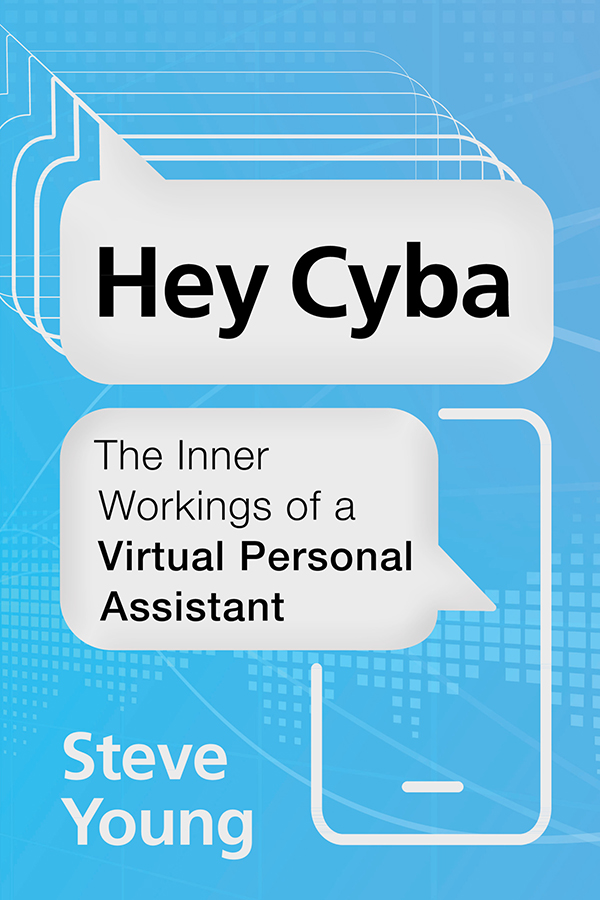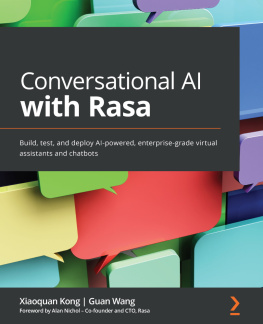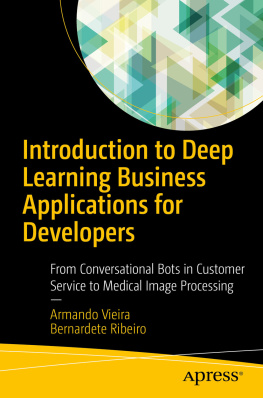
Contents
Guide
Pages
Hey Cyba
Recent developments in artificial intelligence, especially neural network and deep learning technology, have led to rapidly improving performance in voice assistants such as Siri and Alexa. Over the next few years, capability will continue to improve and become increasingly personalised. Todays voice assistants will evolve into virtual personal assistants firmly embedded within our everyday lives.
Told through the view of a fictitious personal assistant called Cyba, this book provides an accessible but detailed overview of how a conversational voice assistant works, especially how it understands spoken language, manages conversations, answers questions and generates responses. Cyba explains through examples and diagrams the neural network technology underlying speech recognition and synthesis, natural language understanding, knowledge representation, conversation management, language translation and chatbot technology. Cyba also explores the implications of this rapidly evolving technology for security, privacy and bias, and gives a glimpse of future developments. Cybas website can be found at HeyCyba.com .
STEVE YOUNG has more than 40 years of research experience in speech processing and AI. He founded a number of speech technology startups, including Entropic, acquired by Microsoft in 1999, and VocalIQ, acquired by Apple in 2015, following which he worked in the Apple Siri Development team. He is a Fellow of the Royal Society, the Royal Academy of Engineering, the IET and the IEEE. He holds an IEEE Signal Processing Society Technical Achievement Award, the ISCA Medal for Scientific Achievement, a European Signal Processing Society Technical Achievement Award and the IEEE James L. Flanagan Speech and Audio Processing Award.
Hey Cyba
The Inner Workings of a Virtual Personal Assistant
STEVE YOUNG
University of Cambridge


University Printing House, Cambridge CB2 8BS, United Kingdom
One Liberty Plaza, 20th Floor, New York, NY 10006, USA
477 Williamstown Road, Port Melbourne, VIC 3207, Australia
314321, 3rd Floor, Plot 3, Splendor Forum, Jasola District Centre, New Delhi 110025, India
79 Anson Road, #0604/06, Singapore 079906
Cambridge University Press is part of the University of Cambridge.
It furthers the Universitys mission by disseminating knowledge in the pursuit of education, learning, and research at the highest international levels of excellence.
www.cambridge.org
Information on this title: www.cambridge.org/9781108838818
DOI: 10.1017/9781108976718
Steve Young 2021
This publication is in copyright. Subject to statutory exception and to the provisions of relevant collective licensing agreements, no reproduction of any part may take place without the written permission of Cambridge University Press.
Printed in the United Kingdom by TJ Books Limited, Padstow Cornwall
A catalogue record for this publication is available from the British Library.
ISBN 978-1-108-83881-8 Hardback
ISBN 978-1-108-97236-9 Paperback
Cambridge University Press has no responsibility for the persistence or accuracy of URLs for external or third-party internet websites referred to in this publication and does not guarantee that any content on such websites is, or will remain, accurate or appropriate.
Preface
The potential for artificial intelligence (AI) to make a major societal impact over the next decade is now widely accepted. Central to these developments will be conversational agents for which we already have exemplars in the form of Alexa, Siri and others. Conversational agents are critical because they allow humans to interact with complex IT systems using natural language. They can simplify access to a wide range of services and knowledge sources, and they can do this using the widely accessible medium of the human voice.
A major trend over the next few years will be a significant increase in the level of personalisation available from conversational agents. They will learn the preferences of their human user, they will maintain a personal history of places visited, people met and major events and they will use this to customise the user experience. They will in effect become virtual personal assistants and it seems very likely that they will become firmly embedded within our everyday lives.
Much has been written about AI and doubtless much more will be written in the future. However, there are rather few books outside of the research community which describe how AI in general and conversational agents in particular actually work.
Next page












